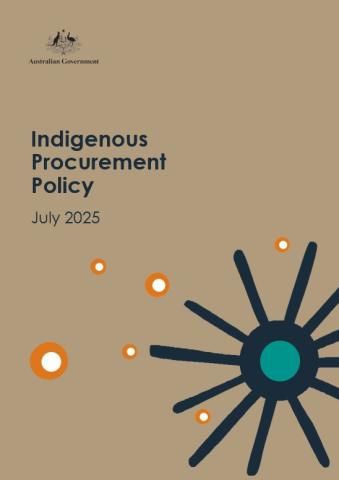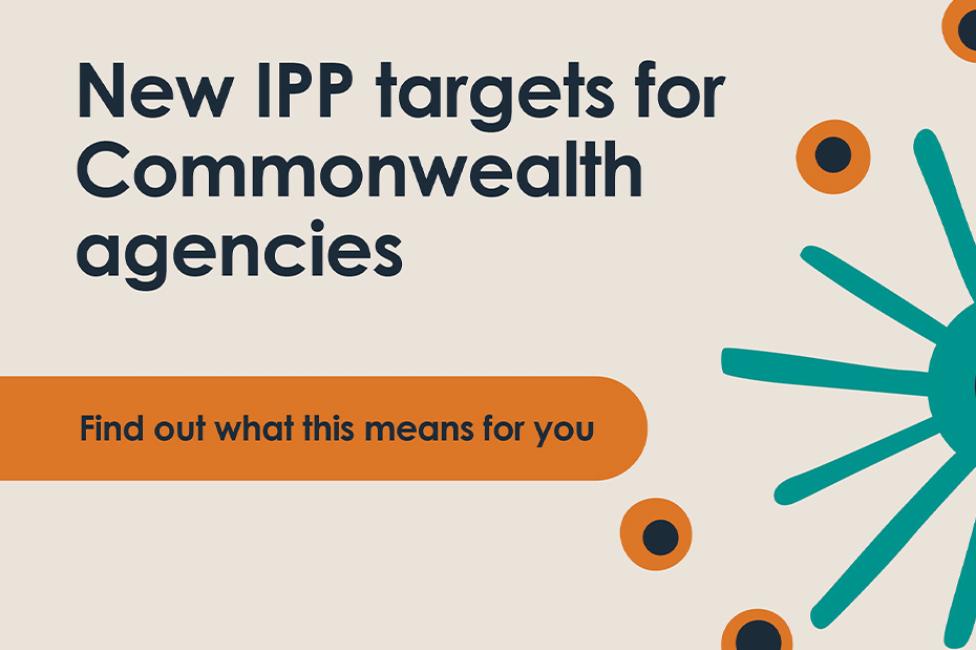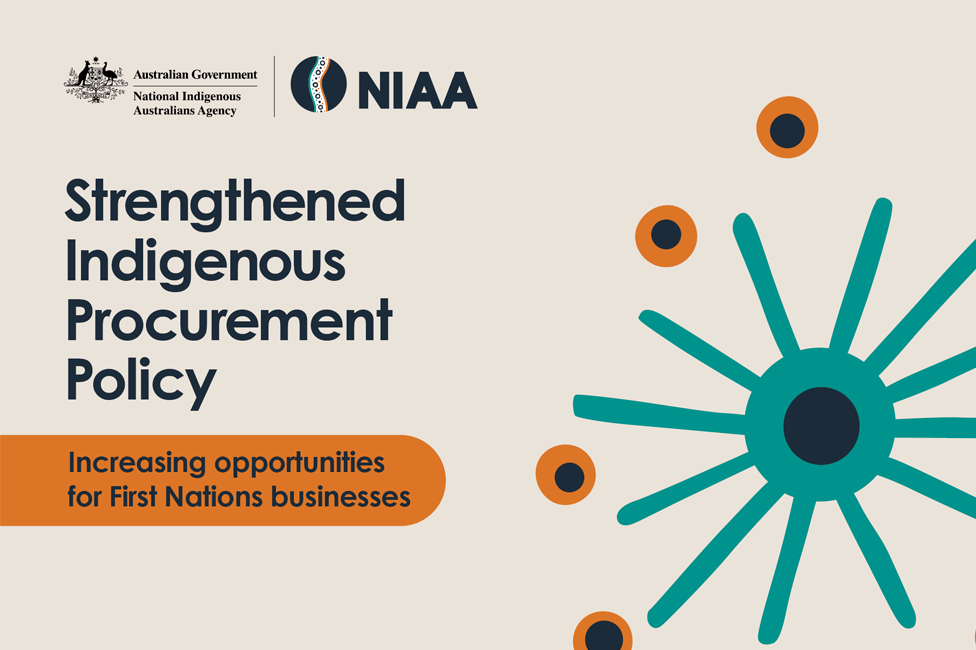Indigenous Procurement Policy (IPP) changes
In February 2025, the Australian Government announced changes to the IPP to increase the ambition of the policy and ensure that the economic benefits of the IPP are genuinely flowing to First Nations people as intended.
IPP Overview
The primary purpose of the Indigenous Procurement Policy is to stimulate Indigenous entrepreneurship, business and economic development, providing Indigenous Australians with more opportunities to participate in the economy.
Prior to the implementation of the policy in 2015, Indigenous businesses secured limited business from Commonwealth procurement. The policy is intended to significantly increase the rate of purchasing from Indigenous businesses.
How the IPP works:
- Annual targets for the volume and value of contracts to be awarded to Indigenous businesses by the Commonwealth and each Portfolio.
- The Mandatory Set Aside (MSA) requires that Indigenous businesses be given an opportunity to demonstrate value for money before a general approach to market. The MSA applies to procurements to be delivered in remote Australia and for all other procurements wholly delivered in Australia valued between $80,000 and $200,000 (GST inclusive).
- Indigenous employment and business participation targets apply to contracts wholly delivered in Australia valued at $7.5 million or more in 19 industries, known as Mandatory Minimum Indigenous Participation Requirements (MMR).
Exemption 16 of the Commonwealth Procurement Rules allows portfolios to procure directly with Indigenous small to medium size enterprises, provided the enterprise can demonstrate value for money.
The success of the IPP is measured by:
- An increase in the number of Indigenous businesses awarded a contract
- An increase in the volume and value of contracts awarded to Indigenous businesses.
Since 2015, the IPP has performed well against these KPIs, generating over $9.5 billion* in contracting opportunities for Indigenous businesses. This has involved over 64,000 contracts* awarded to more than 3,900 Indigenous businesses*.
*Data as at 30 September 2023, revised on 27 February 2024 due to a small number of misidentified contracts being previously included in calculations.
Detailed data for 2022-23 Commonwealth Indigenous procurement outcomes is available at:
- 2022-23 Commonwealth Indigenous procurement outcomes
- Mandatory set aside results
- Mandatory Minimum Indigenous participation requirements (MMR)
IPP Guides
Guides for managing the IPP’s mandatory minimum requirements (MMR)
- Guide 1: Procuring Officials and Contract Managers
- Guide 2: Potential Suppliers
- Guide 3: Indigenous businesses
(currently under development)
Guides for general IPP use
- Guide 4: Welcome pack for Industry Contractors (How to use the IPP Reporting Solution)
- Guide 5: Model Clauses
Factsheets for general IPP use
- Factsheet: Overview
- Factsheet: Mandatory Minimum Indigenous Participation Requirements
- Factsheet: Mandatory Set Aside
IPP Data/results
2022-23 Commonwealth Indigenous procurement outcomes
Over 1,400* Indigenous businesses secured more than 12,000* new contracts during the 2022‑23 financial year. As of February 2024, these were valued in total at over $1.4 billion.
The Commonwealth and all portfolios exceeded their 2022-23 targets of 3 per cent of the number and 1.75 per cent of the value of accessible contracts being awarded to Indigenous businesses.
IPP data will change as contracts are varied or published on AusTender and will likely vary from Indigenous procurement published by individual portfolios.
The method for calculating and measuring performance against the target is outlined in the IPP policy document. The following data is current as at 27 February 2024*.
| Portfolio | Number Target | Contract count against target | Value Target | Value of contracts |
|---|---|---|---|---|
| Agriculture, Fisheries and Forestry | 97 | 472 | $15,465,696 | $16,699,873 |
| Attorney-General's | 108 | 430 | $8,883,475 | $28,255,659 |
| Climate Change Energy the Environment and Water | 43 | 751 | $6,435,957 | $71,948,114 |
| Defence | 737 | 5,070 | $207,369,467 | $680,558,931 |
| Education | 9 | 303 | $1,803,001 | $11,939,116 |
| Employment and Workplace Relations | 78 | 354 | $20,805,061 | $76,951,780 |
| Finance | 62 | 239 | $8,432,612 | $102,149,825 |
| Foreign Affairs and Trade | 63 | 265 | $3,893,696 | $14,526,038 |
| Health and Aged Care | 121 | 577 | $17,190,837 | $106,477,292 |
| Home Affairs | 48 | 2341 | $10,486,401 | $15,546,668 |
| Industry, Science and Resources | 72 | 675 | $12,612,130 | $36,791,303 |
| Infrastructure, Transport, Regional Development, Communications and the Arts | 55 | 720 | $7,230,677 | $112,115,599 |
| Parliamentary Departments | 14 | 59 | $1,734,447 | $3,257,692 |
| Prime Minister and Cabinet | 42 | 758 | $3,379,133 | $65,618,439 |
| Social Services | 95 | 1020 | $25,053,518 | $41,558,758 |
| Treasury | 151 | 507 | $21,343,756 | $36,742,028 |
| Veterans' Affairs | 86 | 206 | $6,951,310 | $8,334,293 |
| Total Commonwealth | 1,881 | 14,747 | $379,071,174 | $1,429,471,412 |
*Data as at 30 September 2023, revised on 27 February 2024 due to a small number of misidentified contracts being previously included in calculations.
- For details of how portfolios report contracts against targets refer to the Indigenous Procurement Policy.
- The IPP policy includes multiyear contracts in calculating performance against number targets.
Commonwealth Indigenous Procurement Targets (number and value of contracts by portfolio)
| Portfolio | 2023-24 procurement Number target (3% of number of eligible contracts*) | 2023-24 procurement Value target (2% of value of eligible contracts*) |
|---|---|---|
| Agriculture, Fisheries and Forestry | 58 | $7,188,045 |
| Attorney-General's | 108 | $11,239,428 |
| Climate Change, Energy, the Environment and Water | 107 | $15,285,023 |
| Defence | 764 | $257,448,805 |
| Employment and Workplace Relations | 66 | $124,752,619 |
| Education | 21 | $2,118,586 |
| Finance | 61 | $9,775,227 |
| Foreign Affairs and Trade | 70 | $7,027,781 |
| Health and Aged Care | 136 | $24,879,181 |
| Home Affairs | 47 | $13,772,041 |
| Industry, Science and Resources | 77 | $12,968,414 |
| Infrastructure, Transport, Regional Development, Communications and the Arts | 52 | $6,813,109 |
| Parliamentary Departments | 13 | $1,740,347 |
| Prime Minister and Cabinet | 39 | $3,836,935 |
| Social Services | 91 | $28,253,268 |
| Treasury | 136 | $27,408,074 |
| Veterans Affair | 68 | $7,283,206 |
| Total Commonwealth | 1,914 | $561,790,089 |
* For details on how targets are calculated targets refer to the Indigenous Procurement Policy.
Contract Count by Financial Year
The following graph shows the growing size of the Indigenous business sector since the IPP started.*
Top 5 Industry Categories
The following graph shows the top 5 industry categories by value since the IPP begun in 2015.*
*Data as at 30 September 2023, revised on 27 February 2024 due to a small number of misidentified contracts being previously included in calculations.
Mandatory set aside results
The Mandatory Set-Aside (MSA) arrangements provide Indigenous businesses with the opportunity to demonstrate value for money before the procuring official makes a general approach to the market.
The following tables demonstrate that Indigenous businesses continue to win more contracts under the MSA, including in remote areas.
| Mandatory Set Aside Results | 2017-18* | 2018-19* | 2019-20* | 2020-21* | 2021-22* | 2022-23* |
|---|---|---|---|---|---|---|
| Number of new IPP contracts valued at $80,000–$200,000 and listed on AusTender | 287 | 412 | 477 | 632 | 766 | 466 |
| Number of new IPP contracts, valued between $80,000–$200,000, as percentage of total listed on AusTender | 3.15% | 4.64% | 4.72% | 6.09% | 6.89% | 5.51% |
| Value of new IPP contracts valued at $80,000–$200,000 and listed on AusTender ($ million) | $37.0 | $52.6 | $63.6 | $83.3 | $102.5 | $61.9 |
| Value of new IPP contracts valued between $80,000–$200,000, as percentage of total value of these contracts listed on AusTender | 3.18% | 4.61% | 4.81% | 6.14% | 6.98% | 5.62% |
| Mandatory Set Aside –Remote Performance | 2017-18* | 2018-19* | 2019-20* | 2020-21* | 2021-22* | 2022-23* |
|---|---|---|---|---|---|---|
| Number of new contracts delivered in remote areas | 898 | 835 | 1,126 | 1,520 | 2,276 | 2,411 |
| Value of new contracts delivered in remote areas ($ million) | $113.5 | $90.9 | $118.6 | $82.2 | $204.1 | $90.1 |
*Data as at 30 September 2023, revised on 27 February 2024 due to a small number of misidentified contracts being previously included in calculations.
MSA Notes:
- For full details on the MSA including information on when it does not apply refer to the Indigenous Procurement Policy.
- NIAA was unable to exclude contracts that were subject to an exemption prior to 1 July 2018. Due to this data constraint, for the period 2017-18, performance is likely to be higher than reported in the MSA tables above.
- Under the IPP, the MSA applies to all contracts delivered in remote areas regardless of value. As a result, contracts delivered in remote areas, that also meet the MSA threshold ($80,000-$200,000), are included in both MSA tables on this page.
- IPP data for remote Australia is under-reported as it relies on manual reporting. NIAA continues to work with portfolios to develop better systems to collect this data.
- A map defining the areas considered remote under the IPP is available. Please allow extra time for the map to load on slow connections.
Mandatory Minimum Indigenous participation requirements (MMR) for Indigenous workforce and/or supply targets (MMR)
Since 1 July 2016, 607 contracts* valued at $36.3 billion*, awarded to 313 organisations*, have been subject to the IPP’s mandatory minimum Indigenous participation requirements (MMR).
*Data as at 30 September 2023, revised on 27 February 2024 due to a small number of misidentified contracts being previously included in calculations.
MMR targets apply to contracts wholly delivered in Australia valued at or above $7.5m that are awarded in one or more of 19 specified industry categories.
For more information on the application of MMR targets refer to the Indigenous Procurement Policy and UNSPSC policy guide.
Companies with active MMR contracts
Refer to the spreadsheet for information on companies with active MMR contracts, as at 30 September 2023.




